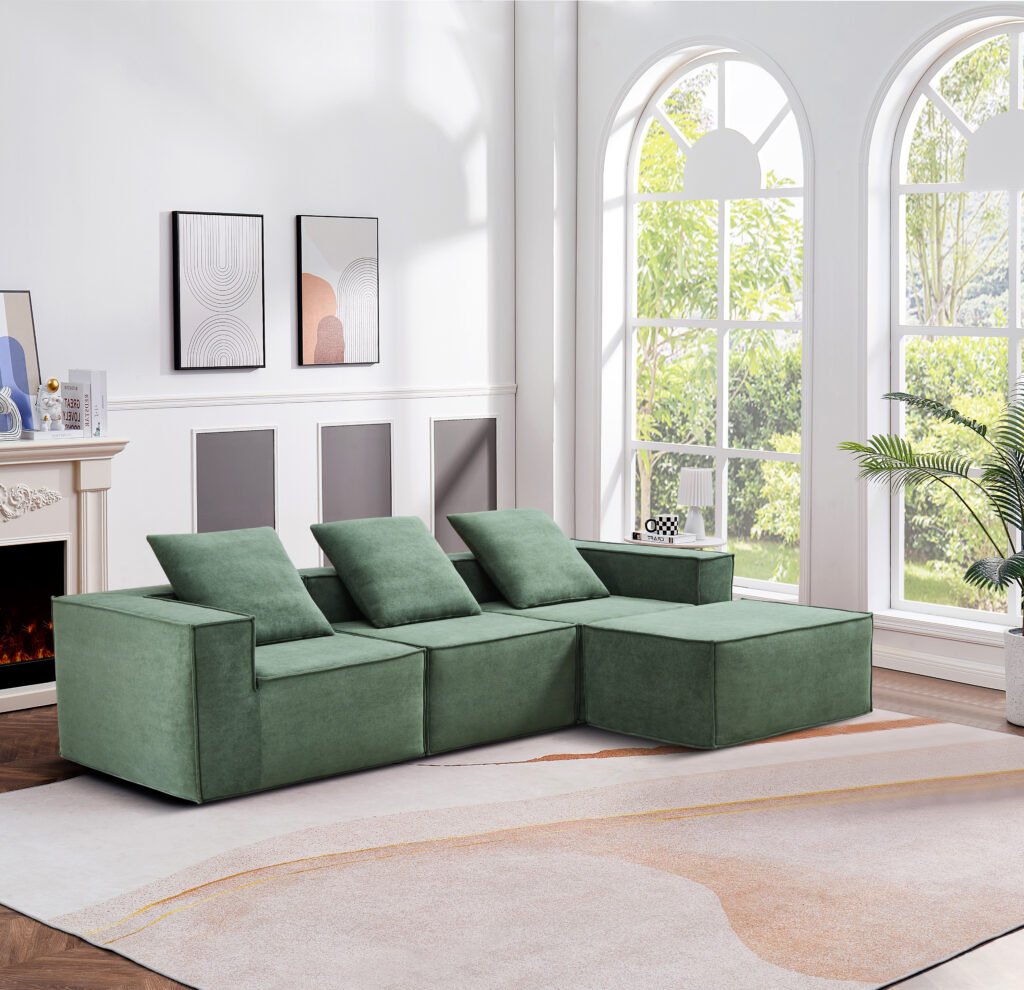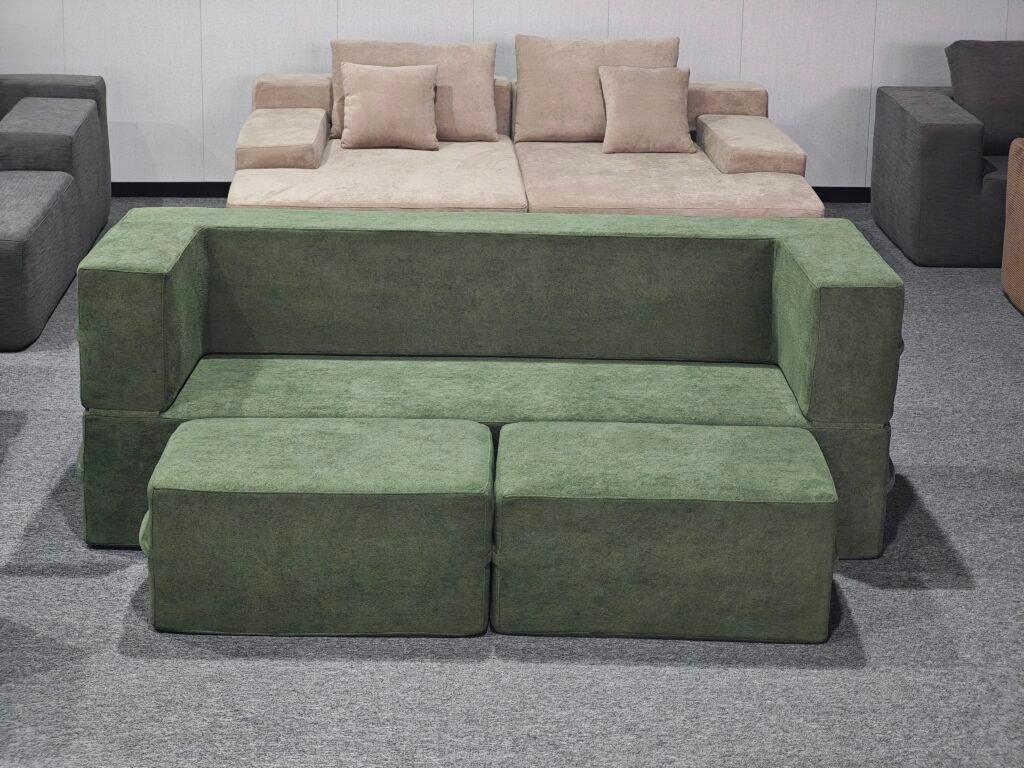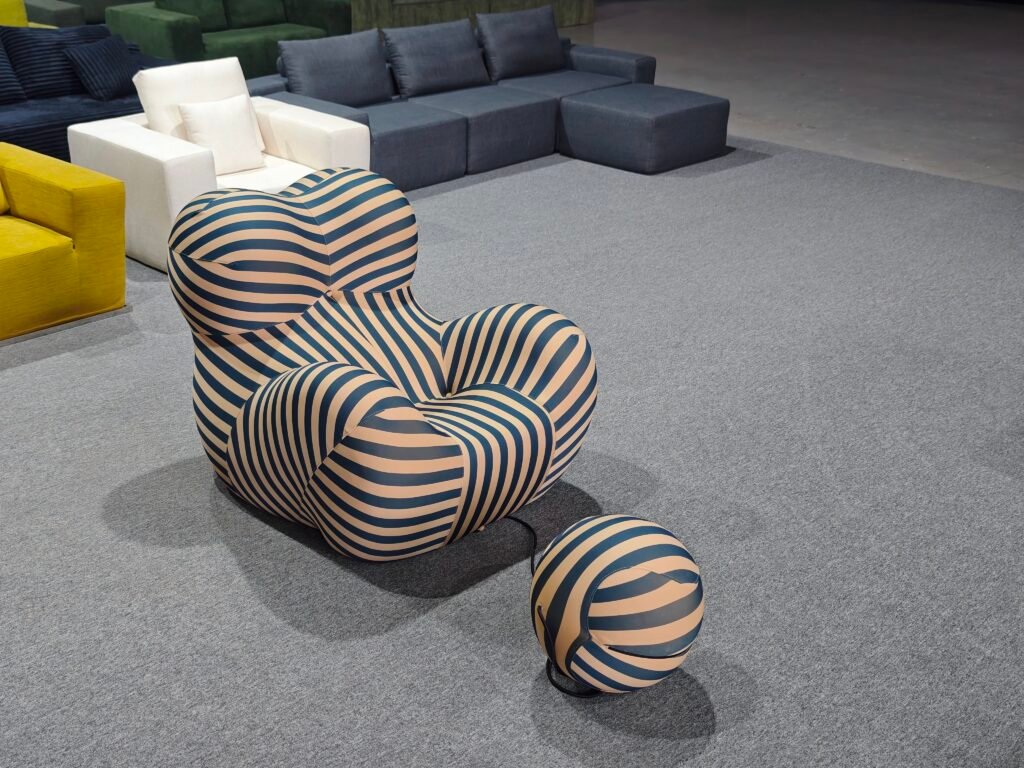In the ever-evolving furniture industry, businesses face a wealth of choices when selecting sofas to sell, deploy, or specify for clients. Among the most important decisions are determining the type of sofa construction and packaging that best balance logistics, cost, customer experience, and style. This choice is particularly critical for businesses focused on efficiency—from e-commerce sellers and dropshippers to hospitality providers and large-scale commercial buyers.
The three dominant approaches in today’s seating solutions are compressed sofas, flat-pack sofas, and modular sofas. Each offers unique benefits and certain limitations, especially when considering supply chain constraints and end-user expectations. This comprehensive discussion explores these three formats in detail, comparing their manufacturing methods, packing, transportation, assembly, customization options, and application scenarios. The article is structured to assist business buyers in making informed decisions, with a spotlight on innovations from leading compressed sofa factories such as modular-sofas.com.


The Rise of the Compressed Sofa: Revolutionizing Furniture Logistics
Compressed sofas represent a transformative model in sofa manufacturing and distribution. Borrowing advances from mattress-in-a-box technology and foam engineering, compressed sofas emerge from factories fully assembled, then subjected to a patented compression and vacuum-sealing process. This reduces their transport volume by up to 65%, enabling unprecedented efficiencies in freight, handling, and warehousing.
What sets compressed sofas apart is their near-immediate readiness for use once unpacked. After removal from their sealed packaging, they self-expand to their original shape and size—typically within one to three days—without any need for assembly or tools. High-density, CertiPUR-US certified memory foam or pocket springs provide cushioning that resists permanent compression damage, while frames are designed with reinforced materials to tolerate the mechanical stresses of compression and rebound.
This innovation not only cuts shipping costs dramatically but aligns well with eco-conscious business practices by lowering transportation emissions and utilizing recyclable packaging materials. Factories like modular-sofas.com lead in combining such sustainable production with flexible customization, OEM/ODM services, and low minimum order quantities (MOQs) that empower startups and e-commerce entrepreneurs alike.
Compression technology also allows consumers to handle bulky furniture conveniently at the point of delivery. For retailers and hospitality operators, this translates to smaller inventory footprints and smoother logistics, leading to more agile supply chains.
Flat-Pack Sofas: A Time-Tested Approach with Assembly Trade-offs
Flat-pack sofas have long been a staple in affordable furniture segments and DIY markets. Unlike compressed sofas, these products are shipped disassembled or partially pre-assembled in flat boxes, consisting of various modules and frames that require on-site assembly.
By disassembling sofas into smaller pieces, flat-pack manufacturers reduce shipping volume relative to fully assembled traditional sofas, though not to the extent compressed foam products can achieve. The assembly component enables straightforward replacement of parts or upgrades, allowing some modular interchangeability.
The key advantage of flat-pack sofas lies in their cost-effectiveness. Simpler manufacturing processes and packing facilitate affordable pricing, which appeals to budget-conscious shoppers. However, this affordability comes with trade-offs. Consumers or businesses must manage assembly logistics, which demands tools, instruction comprehension, and time.
In addition, flat-pack sofas face risks from missing components during shipping, assembly errors, or damage to vulnerable pieces in transit. This situation often results in higher customer service demands and return rates. For some businesses, the added assembly complexity can be a barrier to seamless customer experience, especially in e-commerce markets prioritizing convenience.
Modular Sofas: The Pinnacle of Customization and Flexibility
Modular sofas are crafted from individual components—such as corner units, ottomans, chaise lounges, and armless seats—that connect to create custom configurations. These are prized for enabling buyers or designers to tailor the layout precisely to spatial constraints, aesthetics, and functional requirements.
Modular sofas can be supplied fully assembled, flat-packed, or compressed module-by-module, depending on the manufacturer’s process and client needs. Their hallmark is flexibility, as modules may be added, removed, or replaced over time, extending product lifespan and adapting to evolving décor or capacity requirements.
From a business perspective, modular sofas fit premium markets seeking tailored designs or commercial projects like office lounges, hotels, and luxury residences. However, their custom nature increases production complexity, inventory variety, packaging diversity, and often price points. Businesses must carefully manage supply chains and inventories to offer extensive options without undue cost or lead time.


Comparing Manufacturing Processes and Material Quality
The quality of materials and cutting-edge manufacturing techniques shape all three sofa styles but manifest differently across compressed, flat-pack, and modular categories.
Compressed sofas rely heavily on advanced foam science and frame engineering. Factories employ CertiPUR-US or similar third-party certified foams, which combine softness with resilience, supporting thousands of compression cycles without permanent deformation. Frames use hardwood, engineered wood, or reinforced metals subjected to rigorous tolerance tests. Upholstery ranges from durable, stain-resistant polyester fabrics to genuine or PU leather, often with removable washable covers for longevity and hygiene.
Flat-pack sofa production emphasizes component robustness. Each piece must withstand repeated assembly and disassembly without loosening joints or degrading materials. While foam quality varies widely, simpler foams and less complex spring systems are common to keep manufacturing cost-effective. Upholstery may also be less versatile in fabric choice or finish.
Modular sofas blend these approaches by offering premium materials compatible with flexible design. Foam density, frame strength, and upholstery quality can be tailored to segment needs, often resulting in higher-grade fabrics and multi-layered foam or pocket spring cushions. However, modular designs necessitate precise engineering of connectors and joint mechanisms to maintain stability.
Logistics and Supply Chain Implications
Logistical considerations are critical drivers influencing sofa type selection by businesses.
Compressed sofas provide best-in-class shipping efficiency. With volume reductions up to 65%, a standard 40-foot shipping container can hold four times the number of compressed units compared to traditional sofas. This dramatic improvement slashes shipping costs and storage footprint. Retailers and distributors save on warehousing and improve stocking flexibility. Additionally, vacuum-sealed packaging protects products from moisture or impact damages.
Flat-pack sofas, while reducing shipping volume compared to unpacked sofas, generally do not achieve the same compression level. They require bulkier boxes and more complex packing sequences to keep all parts organized and undamaged. This translates to higher freight and potential warehouse space usage relative to compressed sofas.
Modular sofas’ shipping efficiencies vary. Smaller modules can be shipped in flat-packed or compressed forms, but multiple boxes per final sofa increase handling complexity. Proper packaging design is essential to avoid damage during transit and facilitate assembly on arrival. For larger commercial orders, modular sofa logistics may involve coordinated multi-box pallet shipments.
Assembly and Customer Experience
From an end-user perspective, the ease of delivery, unpacking, and setup strongly influences customer satisfaction and repeat business.
Compressed sofas excel by arriving fully assembled internally and only needing unfolding and air expansion. Customers face no assembly hassle, making these sofas ideal for e-commerce, fast turnarounds in hospitality, and non-technical users.
Flat-pack sofas require consumers or third parties to assemble components, some with complex instructions and tools. This extra effort can discourage some buyers or lead to improper assembly, impacting durability and returns. For businesses, higher returns and service demands can erode margins.
Modular sofas fall in between, typically requiring connecting modules without heavy assembly tools but sometimes needing minimal setup. Their adaptability enhances appeal but demands clear guidance and customer support.
Customization and Branding Opportunities
Businesses today increasingly tailor furniture offerings to meet customer desires for uniqueness and brand alignment.
Compressed sofa factories like modular-sofas.com support extensive OEM (Original Equipment Manufacturer) and ODM (Original Design Manufacturer) services. Clients can specify upholstery material, colors, patterns, decorative stitching, and even integrate features like USB ports or hidden storage compartments. Branding options extend to embossed logos or custom packaging. The low MOQs and fast turnaround times empower small and large businesses to test new markets efficiently.
Flat-pack manufacturers offer customization mainly within standard component selections and fabric choices. Branding customization is more limited due to logistics and assembly dependencies but still achievable.
Modular sofas are naturally conducive to customization, as segments can be selected or supplied in exclusive fabrics or finishes. However, this generally requires larger minimum orders and longer lead times due to complexity.


Business Applications by Sector
Understanding which sofa type suits your business begins with a thorough appraisal of your market sector and customer expectations.
In e-commerce and dropshipping, compressed sofas dominate. Their plug-and-play nature reduces customer friction and complaints, critical for online sales success. Low MOQs and factory support from vendors like modular-sofas.com allow competitive pricing and branding.
The hospitality industry demands durable, space-efficient furniture for guest rooms, lobbies, and lounges. Compressed modular sofas offer cost-efficient bulk shipping and flexibility. Fast decompression times fit rapid turnover environments. Flat-pack sofas present durability challenges; modular sofas without compression are used mostly in high-end spaces.
Retailers and physical stores appreciate modular sofas for showroom visual appeal and customizable design options. Flat-pack sofas attract bargain shoppers keen on price over assembly complexity. Compressed sofas appear where convenience and premium positioning align.
In corporate offices and commercial interiors, modular sofas provide the needed configurability to fit diverse meeting or lounge areas. Compressed sofas serve startups and agile co-working spaces requiring swift furniture deployment. Flat-pack sofas are less prevalent here.
Detailed Comparison Table of Compressed Sofa, Flat-Pack Sofa, and Modular Sofa
| Feature/Aspect | Compressed Sofa | Flat-Pack Sofa | Modular Sofa |
|---|---|---|---|
| Packaging and Shipping | Fully assembled, vacuum compressed | Disassembled in flat boxes | Separate modules; can be compressed or flat-packed |
| Volume Reduction Efficiency | Up to 65% | Moderate volume reduction | Varies; multiple boxes for modules |
| Assembly Required | None, self-expanding | Complete assembly needed with tools | Minimal assembly; modules connect |
| Delivery Convenience | Home delivery ready, hassle-free | Requires assembly post-delivery | Manageable modules, multi-part shipment |
| Material Quality | Premium certified foam and frame | Variable, often lower-grade to cut costs | Wide spectrum; often premium |
| Customization | Extensive OEM/ODM, fabrics, branding | Limited component and fabric choices | Highly flexible configurations |
| Cost Efficiency (Logistics) | Very high due to compression | Moderate, less volume saved | Depends on module count and packaging |
| Consumer Experience | Easy setup, minimal complaints | Assembly challenges and returns | Design versatility favored |
| Durability and Longevity | Veteran tested for 5000+ cycles | Durable but dependent on assembly | Replaceable individual modules |
| Environmental Sustainability | Recyclable packaging, eco-certified materials | Generally standard packaging | Depends on manufacturer |
| Minimum Order Quantity | Low MOQ (often 1 unit) | Medium MOQ due to part sets | Varies; often higher MOQ for modules |
| Ideal Business Use Cases | E-commerce, hospitality, small retailers | DIY furniture, budget retailers | Commercial, large homes, premium retail |
| Lead Times | Stock within 5–10 days; custom 15–30 days | Variable, often longer due to assembly | Longer due to customization |
Manufacturing Insights from a Leading Compressed Sofa Factory (Modular-Sofas.com)
The modular-sofas.com factory epitomizes excellence in compressed sofa production. Integrating patented vacuum compression machinery with precision ergonomic designs, their workflows ensure sofas are compressed without strain to the frames or upholstery.
Their quality control traverses multiple checkpoints including:
- Foam certification compliance
- Frame stress testing
- Upholstery durability and colorfastness
- Packaging integrity to preserve vacuum seal
Their product range is impressively broad, spanning from compact heating sofa beds to expansive modular sectionals with storage compartments and tech features like USB charging ports. They maintain low MOQs beneficial for startups while supporting large bulk orders for commercial clients.
The factory emphasizes environmental stewardship by using recyclable vacuum films, minimizing packaging materials, and selecting Oeko-Tex 100 certified textiles. These commitments resonate with eco-aware buyers seeking socially responsible supply chains.
Their global logistics network enables FOB, CIF, DDP shipping, and drop-shipping arrangements, enhancing international business scalability.
Strategic Recommendations for Choosing Your Sofa Type
When deciding which sofa type best suits your business, reflecting on the following key themes can provide clarity:
- Analyze your typical customer profile. Tech-savvy e-commerce shoppers prefer minimal effort unpacking; budget DIY customers tolerate assembly; premium clients demand customization.
- Review your distribution and delivery capabilities. Limited warehouse space and consolidated freight favor compressed sofas; in-house assembly teams might leverage flat-pack options.
- Consider your branding ambitions and product differentiation. Compressed sofas offer extensive branding customization routes.
- Evaluate cost allocation. Weigh savings in shipping against assembly costs and after-sales services.
- Check minimum order thresholds in relation to your financial flexibility.
- Think long-term about furniture lifespan and adaptability. Modular sofas shine in growing businesses or diverse client projects needing flexibility.
Partnering closely with trusted factories such as modular-sofas.com offers tailored support, competitive pricing, and confident quality assurance, enabling businesses to optimize their inventory and delight their customers.
Frequently Asked Questions
How long does a compressed sofa take to fully expand after unpacking? Generally, compressed sofas regain their full shape between 24 to 72 hours. Gentle patting can accelerate air release.
Is any assembly needed with compressed sofas? No, compressed sofas arrive fully assembled inside the packaging and require no tools or assembly.
Do flat-pack sofas offer the same shipping savings as compressed sofas? No, flat-pack sofas reduce shipping volume compared to traditional sofas but not as dramatically as compressed foam sofas.
Can modular sofas come compressed? Modules can be individually compressed or shipped flat-packed, depending on factory capabilities and client needs.
Which sofa type offers the best minimum order flexibility? Compressed sofa factories generally offer the lowest MOQs, ideal for small or test orders.


Conclusion
Compressed sofas, flat-pack sofas, and modular sofas each fill distinctive niches in the furniture market. Compressed sofas, as pioneered by factories like modular-sofas.com, combine modern material science and packaging to unlock unparalleled efficiencies in shipping, warehousing, and customer convenience. Their fast expansion and premium material quality make them favorites for e-commerce, hospitality, and small retailers aiming for smooth, scalable operations.
Flat-pack sofas still appeal to cost-conscious buyers prepared for assembly and offer a classic DIY charm. Modular sofas stand out for flexibility, adaptability, and premium aesthetics sought by large projects and luxury end-users.
Selecting which style fits your business requires balancing logistics, customer expectations, price sensitivity, and operational capacity. In partnership with expert manufacturers, you can navigate these dimensions to choose sofas that optimize profitability and lasting satisfaction.
If you desire, further in-depth explorations on supply chain integration, brand-building strategies, or technical briefs on foam technologies and compressing methods can be provided to supplement this foundation.